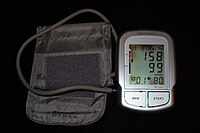
Photo from wikipedia
The prevalence of hypertension increases with age, and oxidative stress is a major contributing factor to the pathogenesis of hypertension-induced kidney damage in aging. The nicotinamide adenine dinucleotide phosphate (NADPH)… Click to show full abstract
The prevalence of hypertension increases with age, and oxidative stress is a major contributing factor to the pathogenesis of hypertension-induced kidney damage in aging. The nicotinamide adenine dinucleotide phosphate (NADPH) family is one of the major sources of reactive oxygen species (ROS) generation, and several NADPH oxidase isoforms are highly expressed in the kidney. Although epigenetic protein modification plays a role in organ injury, the methylation of the oxidant-antioxidant defense system and their role in hypertension-induced kidney damage in aging remains underexplored. The present study investigated the role of NADPH oxidase 4, superoxide dismutases (SODs), catalase, and NOS in Ang-II induced kidney damage in aging. Wild type (WT, C57BL/6J) mice aged 12–14 and 75–78 weeks were used and treated with or without Ang-II (1000 ng/kg/min) for 4 weeks with control mice receiving saline. Aged mice with or without Ang-II exhibited higher mean BP, lower renal blood flow, and decreased renal vascular density compared to young mice. While superoxide, 4-HNE, p22phox, Nox4, iNOS were increased in the aged kidney, the expression of eNOS, MnSOD, CuSOD, catalase, Sirt1, and -3 as well as the ratio of GSH/GSSG, and activities of SODs and catalase were decreased compared to young control mice. The changes further deteriorated with Ang-II treatment. In Ang-II treated aged mice, the expressions of DNMTs were increased and associated with increased methylation of SODs, Sirt1, and Nox4. We conclude that hypermethylation of antioxidant enzymes in the aged kidney during hypertension worsens redox imbalance leading to kidney damage.
Journal Title: Redox Biology
Year Published: 2020
Link to full text (if available)
Share on Social Media: Sign Up to like & get
recommendations!